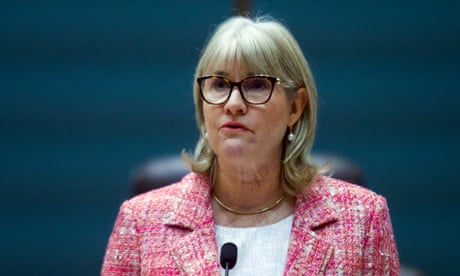Extract from The Guardian
Clubs and bookmakers have set their own restrictions as campaigners await a decision on a proposed ban.
Mon 1 Apr 2024 01.00 AEDT
Last modified on Mon 1 Apr 2024 01.48 AEDTJust minutes after the first bounce in a round one AFL game, families watching on free-to-air television were exposed to more than 70 gambling ads – and all before 8pm.
The fluorescent ads for gambling giant Tabcorp were splashed on digital billboards, despite the company previously declaring there was “too much advertising” and that change was necessary to protect vulnerable people.
“Australian families should be able to watch live sport without being bombarded by gambling advertising,” Tabcorp’s then chief executive, Adam Rytenskild, said in March last year.
Tabcorp concedes it breached its policy of not advertising between the hours of 6.30am and 8.30pm – which is beyond what it is required to do by law. The company says displaying the ads during this time was a mistake.
“Our position on in-stadium advertising is the same as our position on free-to-air television advertising – we don’t advertise before 8.30pm and have not done so since an error was made in Round 1,” the spokesperson said.
“We know the community is over it and it’s the right thing to do.”
According to current rules and regulations, Tabcorp did nothing wrong. While ads cannot be broadcast during matches, bookmakers can pay for pitch-side ads within view of cameras. It’s a loophole that public health experts want tightened.
“This signage creates an impression for young people that gambling is embedded as part of the game,” said Samantha Thomas, a gambling researcher at Deakin University.
“Governments have a responsibility to close the range of channels that the gambling industry can use to promote its products and create brand awareness and loyalty – particularly with a view to protecting children and young people.”
‘Disappointing and frustrating’
Tabcorp’s “error” is the latest example of how, in the absence of a long-awaited regulatory crackdown, bookmakers and clubs have begun to self-regulate themselves to different standards. A conflict over gambling ads is one reason why the powerful wagering lobby splintered in recent months.
Five years ago, the Geelong Cats banned all gambling ads at its home ground. The Sydney Swans agreed to do so in 2021. Gambling ads remain at the MCG – although they have decreased in recent years – and there appears to be no limit at the Gabba in Brisbane.
All Victorian AFL clubs have turned their backs on gambling sponsorships, while the Brisbane Lions and the GWS Giants have a sponsorship deal with Tabcorp. The AFL itself continues to take a cut of every bet placed on the sport, and promotes bets for its official wagering partner, Sportsbet, that have a high failure rate.
These inconsistencies have frustrated AFL fans still waiting for regulation. A survey conducted by the AFL Fan Association found 79% of respondents supported a ban on gambling ads at stadiums. When that result was released more than a year ago, the association’s president, Ron Issko, hoped the government would act.
“It’s disappointing and frustrating,” Issko says. “Fans had clearly said that they want gambling ads significantly reduced, if not abolished, at grounds, on TV, on radio, on social media – and they are concerned we are normalising gambling.
“We are potentially grooming our kids to become gamblers. We get a number of parents writing to us saying, ‘my 11-year-old son knows the odds of who is going to kick the first goal’. What is going on?”
A proposed ban
The Albanese government is yet to respond to a parliamentary inquiry, led by the late Labor MP Peta Murphy, which called for a total ban on gambling ads, after a three-year transition period. While broadcasters don’t expect a total ban, the communications minister, Michelle Rowland, has said the “status quo” is untenable.
“The government is examining restrictions and engaging with stakeholders, including harm reduction advocates, health experts and industry, as we develop our policy,” Rowland said earlier this year.
A government response to the inquiry was due by the end of 2023.
Multiple gambling industry sources suggest the response was delayed after Murphy, 50, died.
Like Issko, the Royal Australian and New Zealand College of Psychiatrists’ president, Dr Elizabeth Moore, is also concerned by the delay. Moore is calling on the government to adopt the Murphy inquiry’s recommendation.
“There is a strong correlation between problem gambling and comorbid mental health disorders, including depression, anxiety, and personality disorders,” Moore says.
The shadow communications minister, David Coleman, also says action is overdue. More than a year ago, the federal opposition proposed a ban on all gambling advertising an hour either side of live sport matches.
“Had the government supported our bill the restrictions on gambling adverts during live sport would already be in place and running by now,” Coleman said.
The government has already introduced regulation to protect consumers from gambling harm, including a national self-exclusion register and more assertive public health warnings on broadcast ads. But Moore and others believe those changes don’t go far enough.
Tim Costello, the chief advocate for the Alliance for Gambling Reform, says the return of football has reminded many families of what they hate: “a tsunami of gambling and sports betting ads”.
“Fans hate it,” Costello says. “Parents hate it. But the AFL is unmoved. Do gambling interests now completely own our game?”

No comments:
Post a Comment